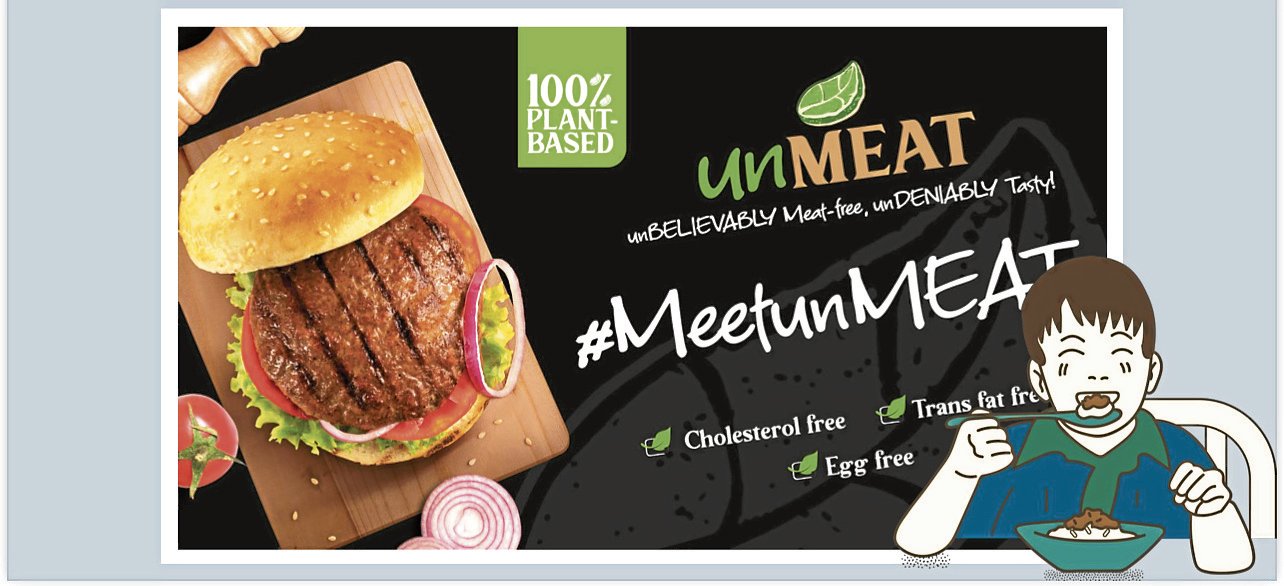UnMeat wants bite of global alternative meat market

BETTER CHOICE UnMeat promises to give buyers “value for money” as it is about 50-percent cheaper than foreign alternatives.
UnMeat, the meat alternative brand of Po family-led Century Pacific Foods Inc. (CNPF), is out to make its presence felt in the global market, starting with the Middle East, as part of the plans to cash in on the growing consumer demand for healthier food options.
CNPF executive chair Christopher Po said the newly launched UnMeat business could grow by 20 percent to 30 percent annually and easily account for over 10 percent of CNPF’s portfolio in the coming years.
The group is developing UnMeat not just for the Philippines but for the global market, driven by increasing consumer preference for healthier products alongside validation from nutrition science research, CNPF president Teodoro Po said.
The brand proposition is to give consumers “value for money” as it is about 50-percent cheaper than comparable international brands.
On the offshore expansion of UnMeat, Gregory Banzon, CNPF chief operating officer, reported that the brand had landed in the Middle East via the United Arab Emirates.
Article continues after this advertisement“We’re already displayed in 150 doors (referring to retailers) and getting good response when making presentations to the rest of the countries in the GCC (Gulf Cooperation Countries). Qatar, Oman and Kuwait are the next three markets,” Banzon said.
Article continues after this advertisementThis month, UnMeat is also scheduled to land in the United States. Efforts to introduce the brand to key distributors, brokers and retailers are being intensified, he said.
“This is the must-win market because North America and Europe are the larger plant-based markets globally,” Banzon said.
UnMeat is also expected to debut in Singapore and Australia in the next months. At the same time, the group is preparing the accreditation to enter the European market.
Other key players in the meat alternative space are Beyond Meat, Oatly and Quorn, a UK-based subsidiary of newly listed local firm Monde Nissin.
“By 2040 to 2050, global population will be about 10 billion and we really need to future-proof the business and global food security by finding new and alternative sources of food and I think plant-based is going to be a category with a sharp trajectory and we want to get in early,” Banzon explained.
To make inroads in overseas markets where exporting from the Philippines is not possible, Banzon said the group might take the toll manufacturing route.
“This will simplify our supply chain, drive growth and make us competitive at an early stage and it gives us the runway to grow the business to a certain scale that will trigger the future of being able to set up manufacturing facility there,” Banzon said.
During the recent company’s stockholders’ meeting, Po also announced an upgrade in CNPF’s group-wide 2021 net profit and revenue growth guidance to 20 percent from the usual annual range of 10-15 percent.
CNPF—a leading canned food manufacturer—was among the few businesses that unwittingly thrived when the coronavirus pandemic erupted last year, as demand for shelf-stable products surged among locked-down consumers. It delivered a net profit growth of 24 percent to P3.9 billion last year, on the back of a 19-percent growth in revenues to P48.3 billion.
This year, Po said net income and revenues would continue to grow by close to 20 percent, especially with the additional kick provided by the Corporate Recovery and Tax Incentives for Enterprises Act, which lowered corporate income taxes.
Other segments of CNPF’s business have likewise performed well, with dairy posting the fastest annual growth of about 30 percent to 40 percent in the past four to five years, he said. CNPF also expects the newly acquired refrigerated meat business to expand by 20 percent to 25 percent a year.
“Refrigeration penetration (local) is below 50 percent so as more households are able to afford a refrigerator, there’s room for that market to grow,” Po said at a press briefing after the meeting.
